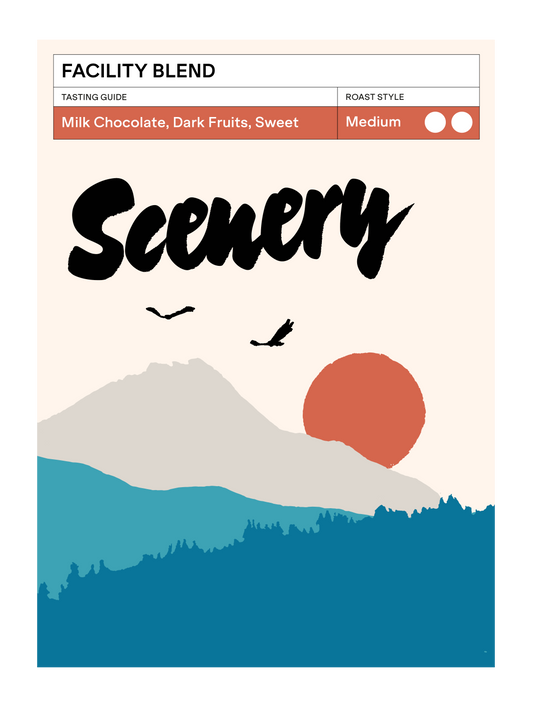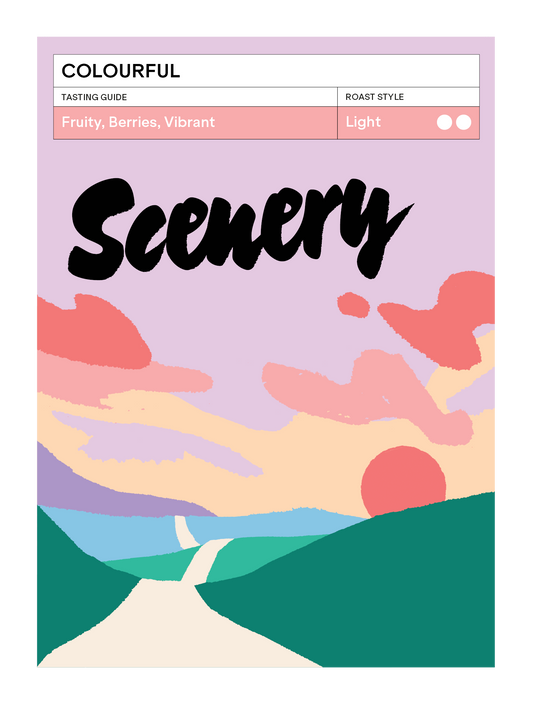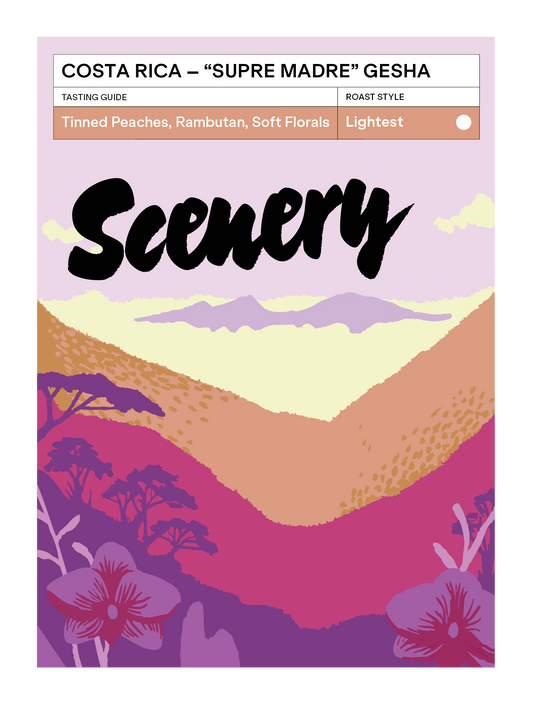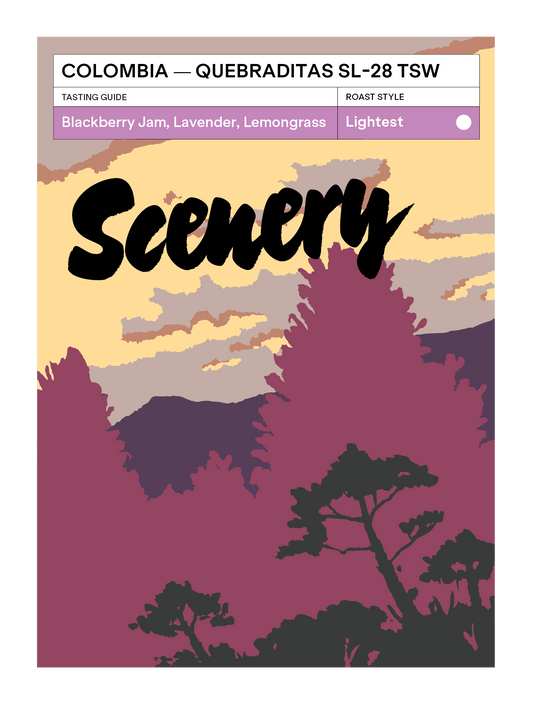There are few things as satisfying as a really good washed Kenyan coffee. Tasting like fruit cordial and warm climate red wines, they’re in a class of their own. This AB lot hails from the renowned Kieni washing station in Nyeri, and blew us away as the top coffee 4 times in blind cuppings.
Brew Guide:
Best Brewed with: Filter
Kenyan coffees are so well known for their big, punchy acidity and ripe fruit notes. This is the first coffee we would strongly suggest as filter only - those with a professional level setup willing to pull 1:3 or 1:4 shots will be able to balance the acidity on espresso, but this coffee will be a bit of a lemon juice ‘spro on a sage or similar home setup.
We’d suggest trying different ratios - 1:16 (or 60g per litre) all the way to 1:20 (50g per litre). Stronger ratios will have syrupy texture, but less clarity, whereas more open ratios show the full complexity this coffee has to offer.
We’re tasting: Intense jammy fruit on the dry aroma with notable florals, in the cup a zippy acidity with layered ripe berry notes - blackcurrant, gooseberry, redcurrant and white grape. As it cools a sweet citrus like meyer lemon keeps it refreshing, with a softer raspberry note coming to the fore. Complex AF
Traceability
Country of Origin: |
Kenya |
Region: |
Nyeri, Ndimaini town |
Producer Group: |
1500 smallholder farmers in the Mugaga Farmers Cooperative Society |
Factory: |
Kieni CWS |
Variety: |
SL28, SL34, Ruiru 11, Batian. Screen size: AB |
Elevation: |
1700-1800 MASL |
Process: |
Washed - Pulped with an overnight dry fermentation, washed and soaked before drying on raised beds for 10-14 days |
Import Partner: |
Nordic Approach |
The Story:
Kieni has its roots in the Mugaga Farmers Cooperative Society, situated in the heart of Nyeri near Ndimaini town. Established in 1985, this cooperative comprises 1,500 active farmer members cultivating cherries at elevations between 1700 to 1800 metres above sea level. The prevalent coffee varieties include SL-28, SL-34, Ruiru 11 and Batian, grown in nutrient-rich clay loam soil.
The Mugaga Farmers Cooperative Society encompasses several factories, including Kieni, and covers a region with fertile red volcanic soil and a favourable climate.
The coffee production process at Kieni reflects their commitment to quality. It commences with careful cherry selection, with only the best cherries being handpicked and hand-sorted before pulping. The pulped coffee is dry fermented overnight, the native wild microflora fermenting the sticky fruit sugars before thorough washing in specially designed density sorting channels. The coffee is then soaked in clean water in holding tanks (the classic Kenyan “double soak” process). Kenyan coffees are a bit like a proper Neapolitan Margherita (and that isn’t a tomato joke) - a simple combination of high quality ingredients combine to create something far more than the sum of its parts. The varieties grown, the climate and soil, the quality processing (including the double fermentation) combines in an emergent effect to create super intense and tasty lots, with a distinct “flavour of origin”.
The parchment undergoes a precise drying process on raised beds for approximately 10-14 days. Once the parchment reaches the ideal moisture level, it's sent to the dry mill for milling and grading, ensuring consistent quality.
Sustainability is a core value for Kieni, demonstrated through initiatives like wastewater soak pits, which prevent water from flowing into local water systems, protecting the environment.
The cooperative offers technical & agronomic assistance to its members, including sourcing seedlings, planting, weeding, pruning, spraying, and fertilising. Technical guidance and farmer training programs offered by the Ministry of Agriculture contribute to sustainable farming practices.
Kieni, as part of the Mugaga Cooperative Society, extends its support to the community by providing credit facilities for school fees, farm inputs, and advance payments.
Two footnotes for things we feel it's important to acknowledge:
1. Kenya has been a tricky origin to engage with this year - echoes of the colonial past have erupted to cause a crisis in the coffee exporting sector, with the government colliding with multinationals - some of whom we work with closely in other origins as export partners - as well as those who stand to unscrupulously gain from the system. We've written a short precis on the situation in our behind the scenes blog here.
2. Kieni is famously associated with one of the G.O.A.T Danish Roasteries, Coffee Collective. Coffee Collective has been buying directly from Kieni for the past 13 years and have an incredible direct trade relationship - and their work together clearly shows, as this lot, in table after table of top-class (just landed spot) Kenyan coffees stood head and shoulders in blind tasting above the rest. It would be easy for us to pass up buying this coffee lest we impinge on such a legendary pairing; but we also came up in the industry as baristas and roasters who were blown away, year after year, with Kieni consistently producing some of the best Kenyan coffees we would try.
So we’ve bought it for the personally very exciting prospect of seeing what our expression from the very same factory will be - how can our roasting approach and ethos produce a different take with similar raw materials, sourced and roasted for the UK community (and water!)

![[06] Kenya - Kieni AB [CROP 22/23 ARCHIVE]](http://scenery.coffee/cdn/shop/articles/Kieni_shopify.png?v=1714046760&width=1100)



![Colombia - El Jaragual Espresso [25/26]](http://scenery.coffee/cdn/shop/files/colombia_el_jaragual_espresso_2526_shopify_02e82472-3443-4e5f-8e61-54b14caec36f.png?v=1756457993&width=533)


![Ethiopia - Bekele Belacho [24/25]](http://scenery.coffee/cdn/shop/files/ethiopia_bekele_belacho_2425_shopify.png?v=1756459151&width=533)

![Colombia - El Jaragual Caturra [25/26]](http://scenery.coffee/cdn/shop/files/colombia_el_jaragual_caturra_2526_shopify_fd4d2b46-1691-48f4-80e5-9a947ec22713.png?v=1756458088&width=533)

![Kenya - Gatomboya AA [24/25]](http://scenery.coffee/cdn/shop/files/kenya_gatomboya_2425_shopify_e31a726e-cd85-413e-90bb-f61dd9c4d73b.png?v=1756459622&width=533)

![Guatemala - Familia Primavera [24/25]](http://scenery.coffee/cdn/shop/files/guatemala_familia_primavera_2425_shopify_0daed525-97b3-4e51-af76-ea3775a71574.png?v=1756459482&width=533)